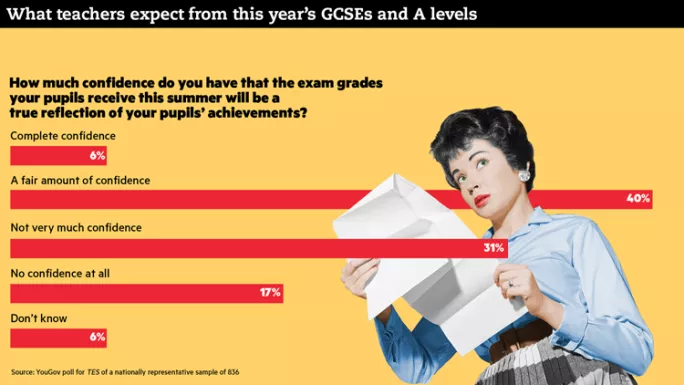- Home
- Exclusive: YouGov poll shows nearly half of teachers don’t trust GCSE and A-level exam results
Exclusive: YouGov poll shows nearly half of teachers don’t trust GCSE and A-level exam results

Nearly half of teachers lack confidence that this summer’s A-level and GCSE results will be true reflections of their pupils’ achievements, an exclusive YouGov poll for TES has found.
The survey shows that only 6 per cent of the profession will have ‘complete confidence’ in the grades that students will receive in the next fortnight.
Nearly one in five teachers (17 per cent) say they will have ‘no confidence at all’.
The quality of marking, a crackdown on ‘grade inflation’, the move away from modular qualifications, volatility of grades in particular subjects, and the general scale and pace of change are being cited by teachers as reasons for their lack of confidence in the system.
Keziah Featherstone, head of the Bridge Learning Campus, an all-through school based in Bristol, said that teachers felt they were “on shifting sands” when it came to exams. “We’ve no way of predicting results. We’re just guessing,” she said.
The poll, carried out last term, found that another 31 per cent of teachers had “not very much confidence” that this summer’s A-level and GCSE grades would do justice to their students’ efforts.
Overall, it found that just 46 per cent of the profession were positive about the accuracy of the results that are about to be published.

Teachers ‘facing a juggernaut’
Geoff Barton, head of King Edward VI School in Suffolk, said that the scale and pace of change to exams meant that there was a general level of mistrust towards the system. He added that he had spoken to many heads who had been worrying about the forthcoming exam results “for weeks”.
“It hangs over you because it is so make or break,” Mr Barton said. “It is a sign of this juggernaut of reform, where everything is being reformed at once and then the buggers who started it disappear and leave the rest of us to pick up the pieces.”
The poll results chime strongly with findings published by Ofqual, the exam regulator. The watchdog has published its own YouGov surveys on teachers’ perceptions of A levels and GCSEs, which show a marked decline in trust over the reliability of the exam system.
This year, 63 per cent of headteachers and 47 per cent of teachers agreed with the statement that they were less confident in the GCSE system than the year before. This was up by 5 percentage points and 4 percentage points respectively on the previous year.
Shaken confidence
The profession was slightly more upbeat about the validity of A levels, but 47 per cent of heads and 35 per cent of teachers still agreed with the statement that they were less confident in the exams than the previous year, according to Ofqual.
Mr Barton said Ofqual’s controversial decision to toughen up on the scope for allowing re-marks of exams had further shaken confidence in the exams system.
“We were having huge amounts of re-marks, particularly at A level,” he said.
“The number of inaccurate marks was simply scandalous. So the moment they say you are not going to have those marks, it leads to a bit of a conspiracy theory of ‘what are they trying to hide?’”
Reports last year of the exam board OCR “desperately” recruiting exam markers by advertising on cruise-ship magazines, Classic FM and Sky TV has added to concerns about the reliability of results, Mr Barton added.
Malcolm Trobe, interim general secretary of the Association of Schools and College Leaders, said that concerns over the legitimacy of public exams had been heightened since 2012, when an alliance of teacher unions, pupils and local authorities took Ofqual to the High Court in an unsuccessful challenge to GCSE English grading decisions.
Results volatility
“The volatility in some results that have been detected by teachers in some schools will have undermined their confidence in the accuracy of the awarding process,” Mr Trobe said.
“Confidence has been rattled, particularly by the English difficulties a few years ago. The volatility in English and maths results will have had an effect as well.”
Russell Hobby, general secretary of heads’ union NAHT, said a “weakness” in how exam reforms had been communicated was undermining teachers’ confidence in the exams.
“People don’t understand the rationale and the reasons behind a lot of the changes,” he said. “All of that reduces confidence when we head into the unknown.”
The focus on the changes to the exam system had become a “distraction”, he added, as teachers were now spending too much time “worrying about exams” instead of thinking about their own subject.
“We’re only at the start of this process,” Mr Hobby said. “So if there is light at the end of the tunnel, then it’s an approaching train rather than the end of the tunnel.”
‘High standards’
An Ofqual spokesperson said: “We know from our annual perceptions surveys that teachers’ views are divided on GCSEs and A levels. Inevitably, in a system that awards 8 million qualifications each year, some students will do better than their teachers expect and some will do worse.
“But this doesn’t mean their grades didn’t reflect their actual performance, or that marking was poor. The great majority of markers are, of course, teachers who are trained to mark and constantly monitored when they do. If mistakes are made, they can still be found and corrected.
“The new review arrangements will focus on doing this. It won’t be harder for schools to ask for a review than before.
“Comparable outcomes ensures standards are maintained from year to year and between exam boards. Grade boundaries do not generally differ widely but move down or up when it is necessary to reflect difficulties in papers, and to make sure the results are fair for all students.”
Michael Turner, the director general of the Joint Council for Qualifications, which represents exam boards, said: “Everyone can be confident that papers will be marked accurately and students will receive the grades they deserve.
“Examiners are experienced teachers who are well trained and receive constant support and supervision to ensure they perform to the high standards that have been set by the exam boards and the regulators. Where markers are not reaching these high standards, they are removed.”
A Department for Education spokesperson said: “All GCSEs and A levels are accredited by Ofqual to ensure they meet the highest standards so teachers, parents and pupils can rest assured that they are completely robust and results will reflect pupils’ achievements.”
This is an article from the 12 August edition of TES. To subscribe, click here. To download the digital edition, Android users can click here and iOS users can click here. This week’s TES magazine is available at all good newsagents.
Want to keep up with the latest education news and opinion? Follow TES on Twitter and like TES on Facebook
Keep reading for just £1 per month
You've reached your limit of free articles this month. Subscribe for £1 per month for three months and get:
- Unlimited access to all Tes magazine content
- Exclusive subscriber-only stories
- Award-winning email newsletters



